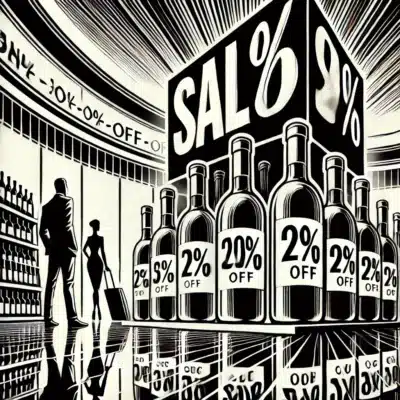Michael Fridjhon: Time for Cape wine to hold the line
By Michael Fridjhon, 18 February 2025

6

There’s no doubt that the world we know – and trade with – is in turmoil. At home we have the uncertainties surrounding the GNU/coalition. The ANC ignores the DA even as it cannot manage itself or its component parts. It is so riven by division that the president finds himself unable to fire a minister caught red-handed stealing and lying to parliament about it. Abroad we have the disruptions of Trumpism – made more colourful with threats of increased duties and diminished aid.
Wine producers may be worse off than many other exporters: our key trading partners have either hiked taxes and excise to stave off a fiscal crisis or are themselves so occupied by their own political issues that survival alone dominates their thinking. And then there’s the state of the alcoholic beverage market worldwide – with reduced consumption (especially among the under 40 year olds) and increased anti-alcohol pressure from the dishonest killjoys at the WHO. It’s not an easy time to be in business – especially not the wine business.
This makes the present moment the ideal time to go out and increase market share. With everyone hiding under the parapet there is less investment in brand-building and more investment in discounting: producers everywhere are looking at their growing unsold inventories and trying to fix the problem of burgeoning stock by slashing prices. What follows becomes a race to the bottom, with retailers (and consumers) holding the aces and the supplier sector perpetually under the whip.
It gets worse. If everyone shaves 10% off their offers, all prices drop equally and the status quo remains. With less money available for brand building (or even for promotion) budgets are pared back. Retail sales surge initially – but then consumers no longer feel any serious inducement to shop, and so another round of cost cutting inevitably follows.
Instead of flirting with the slippery slope of value destruction, savvy producers recognise that this is the time to build brand – counter-intuitive though this may be in the midst of collapsing prices and reduced demand. No one thinks long term in the midst of what appears to be a short term crisis (but which may in fact last a lot longer than we are willing to imagine). However there is no other way forward. There’s no happy ending to a discount war.
While competitors are cutting price, the smart move is to use the tumult and turmoil to show strength, not weakness. Ask yourself why the truly great (non-fashion) luxury brands never hold end-of-season sales. Price and brand are inextricably linked: give ground on price and inevitably your image will suffer.
Cape wine has been through the wringer many times in the past half century. In the isolation era it could only be sold with massive discounts. After 1994 we accepted the prices offered by the international supermarket buyers (partly because they appeared to offer sufficient margin, partly because the years of skelm trading in the 1980s had left the industry without any real pricing benchmarks). Again after 2008 (and then again straight after Covid-19) trading terms were forced upon us. Brand South Africa never really looked strong enough to resist.
Things are a little different now: the world has come to see that our offering is unique, that we over-deliver at all price points, that we are not simply a country of supermarket wines. There will never be a better time to address the tarnished image of the recent past.
Piet Beyers, who knows more than a little bit about wine and about the international luxury goods trade having worked at a high level for various of the Rupert entities, uses a helpful analogy to describe the essentials of the fine wine business. He says it’s like a three-legged pot where each leg plays a crucial role. One leg is great fruit, the other leg is quality wine making, the third leg is appropriate wine marketing. You cannot afford to be without any one of these three pillars. For too long we have relied on the grapes and the oenology and assumed that the marketing would take care of itself. The results of that approach speak for themselves.
Now for the first time in the modern era our vineyards are looking good, we are making fabulous wines, and there’s a groundswell of positive sentiment about Cape wine in the market. We must hold onto our gains AND we must advance while everyone else is on the retreat. To fall back onto discounting would be to undermine the value of the recent achievements in image building. This may be the hardest thing we have ever attempted to do: to hold firm despite the enormous downward pricing pressure of the bear market.
- Michael Fridjhon has over thirty-five years’ experience in the liquor industry. He is the founder of Winewizard.co.za and holds various positions including Visiting Professor of Wine Business at the University of Cape Town; founder and director of WineX – the largest consumer wine show in the Southern Hemisphere and chairman of The Trophy Wine Show.







jeremy sampson | 26 February 2025
Well said, and yes the third leg is marketing.
So step one: make sure you have a protectable distinctive trademark (brand).
Davy Strange | 23 February 2025
Abso-freaking-lutely!
Go for it, my South African friends!
Mike Ratcliffe | 22 February 2025
Well said Michael!
Heinrich Venter | 20 February 2025
Hear hear!
Paul McNaughton | 19 February 2025
Agree totally.Well said.
Wade | 18 February 2025
Spot on Michael